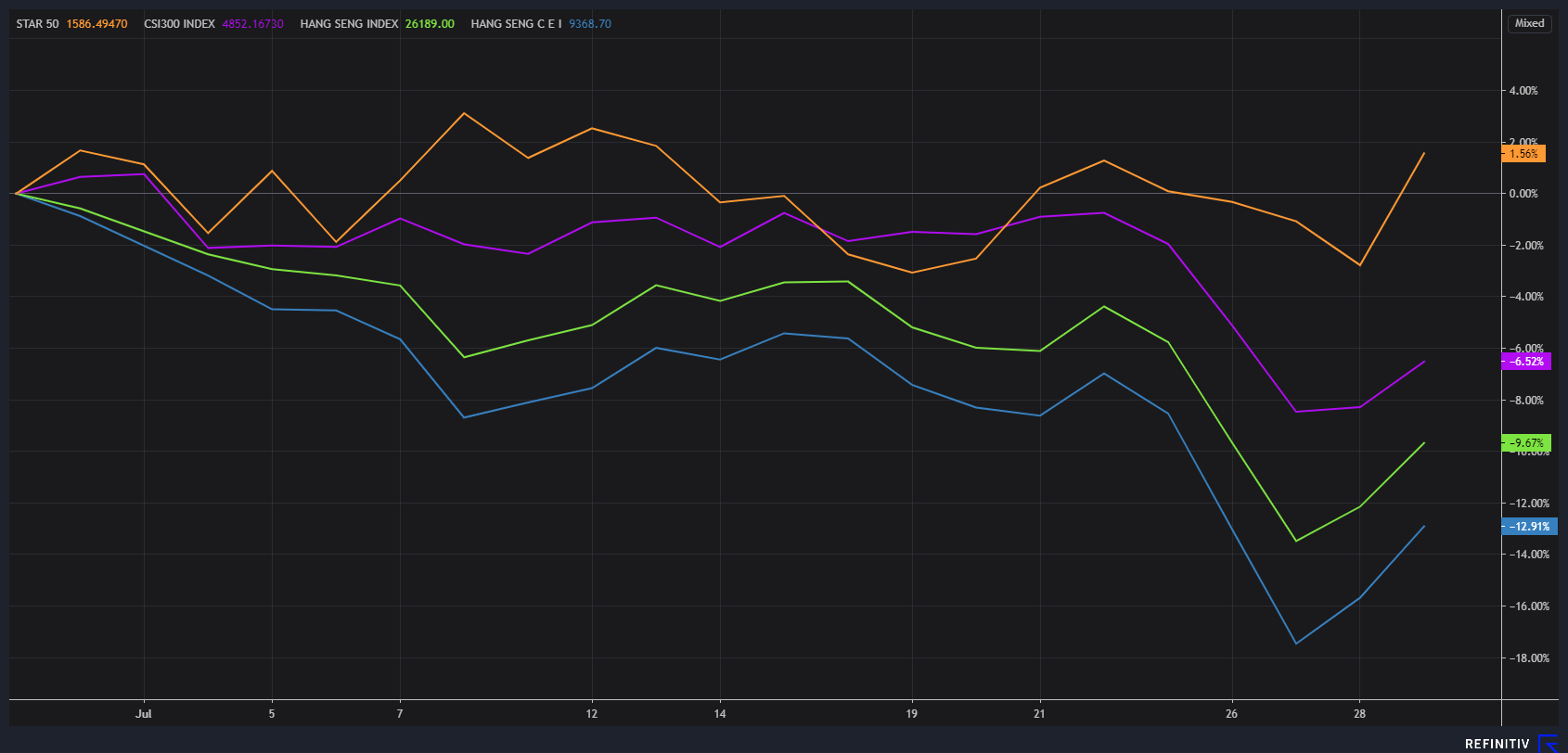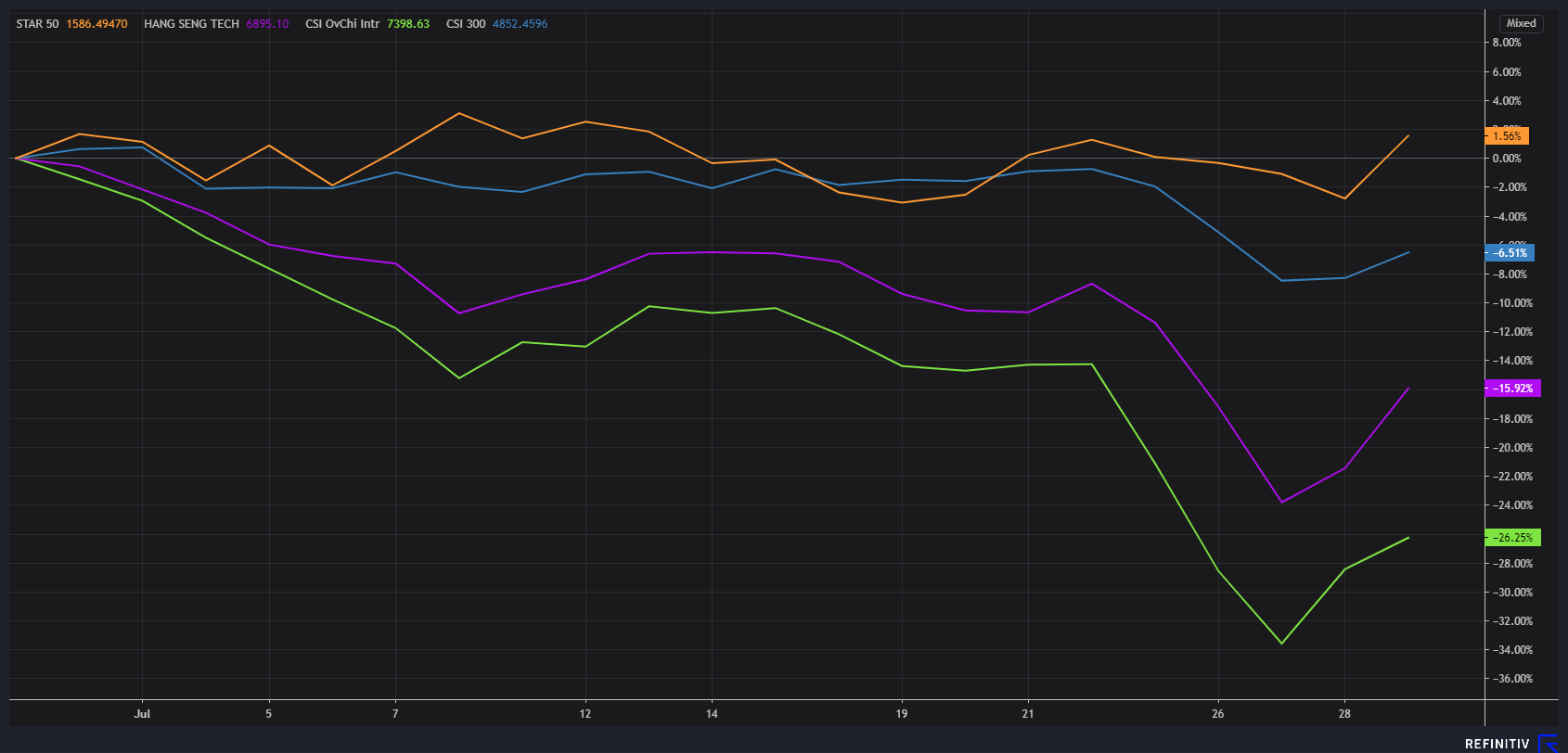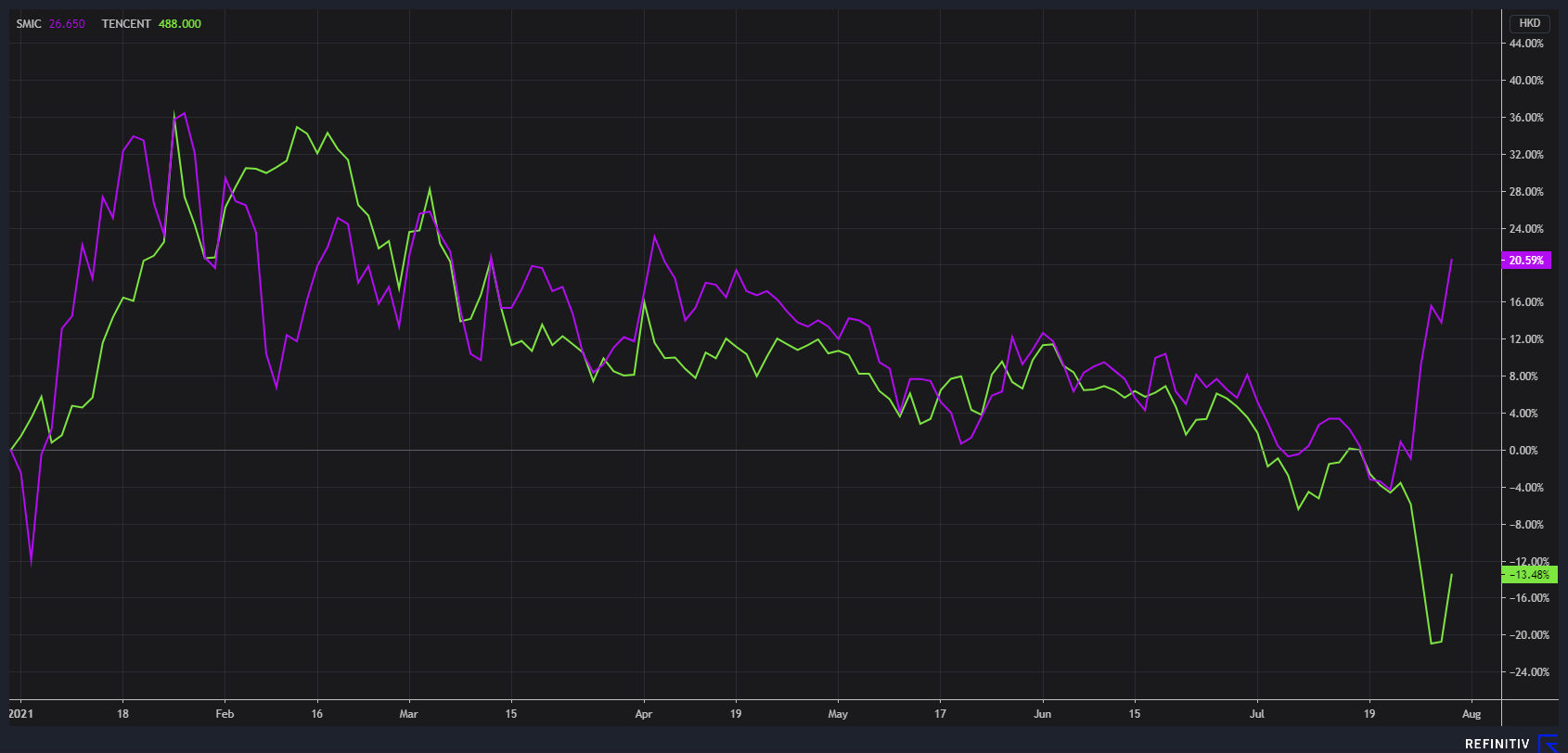Should Investors Buy China Stocks After Tech Crackdown?
July 29, 2021

The selling of Chinese equities has become indiscriminate. Sentiment has become so negative it may take a while for the dust to settle.
But that same extreme of negativity may open up opportunities soon for the patient investor.
For starters, the commentators have focused on the main indices – the Hang Seng Index and the CSI 300 – to sell the bearish China story.
That’s not unreasonable, per se. But doing so misses the underlying dynamics of what is happening to Chinese equities underneath the main indices.
Pressure on platforms
Consumer-facing, online platform companies are the ones under the most regulatory pressure. What is bearing the brunt of the selloff is the consumer-facing, online platform and app-based tech sector.
They are the ones in the regulatory spotlight – for scrutiny on matters that are quite mainstream policy concerns in Developed Markets.
These go to, among other things, antitrust, consumer protection, and data privacy issues.
Tech is different
Discriminate between tech companies that drive economic growth and those that thrive off economic growth.
Note that tech companies with harder, core and cutting-edge technologies – such as those on the SSE Star50 Index – have been quite resilient amid the ongoing storm.
Over the past month, the Hang Seng Index in Hong Kong fell 9.7%. The Hang Seng China Enterprises Index (HSCEI) fell 12.9%. The CSI 300 suffered less, down by 6.5% (see figure 1).
Figure 1

And the Star50 Index was up 1.6%. So, the first takeaway is that, for opportunities, look to onshore A-shares, which have been and are likely to continue to be more resilient than H-shares (in Hong Kong).
Be mindful of internet names and exchanges
Investors should discriminate between offshore internet stocks and A-shares. The real damage has been in the Hang Seng Tech, down 16.9%, and the H11137 index (the CSI Overseas China Internet), which is down 25.7% (see figure 2).
Figure 2

This is the real focus of the Chinese regulatory blitz – constituent stocks include Alibaba Group Holding Ltd (NYSE: BABA) (SEHK: 9988), Meituan Dianping (SEHK: 3690), Tencent Holdings Ltd (SEHK: 700), Tencent Music Entertainment Group (NYSE: TME), and TAL Education Group (NYSE: TAL).
So, the second takeaway is favour hard, core, leading-edge technology companies that are likely to drive economic growth – rather than platform companies that derive their success from China’s economic growth.
A case in point is the sudden violent divergence between Semiconductor Manufacturing International Corporation (SEHK: 981) (SMIC) and Tencent over the past week-and-a-half.
The two stocks had been tracking each other until recently – one stock’s losses appear to have been the other’s gains (see figure 3).
Figure 3

Further, an understanding of what’s driving the Chinese regulatory blitz may give confidence to investors seeking long-term opportunities.
Leveling the playing field
Consider the actions taken against Ant Financial in November last year, when its Initial Public Offering was suspended due to what the Shanghai Stock Exchange described as “changes in the financial technology regulatory environment”.
But long before then, banks had been complaining about fintechs having unfair advantages on an uneven playing field.
Ant Financial – despite having expanded into online banking – was not subject to the same capital adequacy and leverage requirements as bricks and mortar banks.
In a report published earlier this year, independent research house TS Lombard said Ant Financial was “six times more levered than a typical Chinese bank.”
More competition
This should create a more competitive market for Small and Medium Enterprises (SMEs). Among other things, Chinese regulators have issued rules that disallow exclusivity contracts for sellers.
This was allegedly a common practice among online retailers of requiring sellers to “choose one between two”. Under this practice, sellers could not operate on two different platforms.
Antitrust regulations are also aimed at getting better deals for consumers. China’s State Administration for Market Regulation (SAMR) has also set new rules against market collusion.
The SAMR said it wanted to “stop monopolistic behaviours in the platform economy and protect fair competition in the market.”
Data protection
Part of the better deal for consumers is better supervision of the handling of personal data by internet companies.
The new rules require companies to get consumers’ consent for data collection; forbid companies from denying services to customers who decline consent; and they enable consumers to access their personal data held by companies.
China’s internet giants had for years blocked access to one another’s products and apps. These practices will henceforth be regarded as unfair monopolistic practices.
As US tech news publisher TechCrunch reported earlier this year: “The thick walls that (Chinese) tech companies build against each other are starting to break down……
Alibaba has submitted an application to have its shopping deals app run on WeChat’s mini program platform….
For years, Alibaba services have been absent from Tencent’s sprawling lite app ecosystem, which now features millions of third-party services.
Vice versa, WeChat is notably missing from Alibaba’s online marketplaces as a payment method. If approved, the WeChat-powered Alibaba mini app would break with precedent of the pair’s long stand-off.”
That’s now changing as a result of the regulatory reforms. The Wall Street Journal reported earlier this month that China’s two most powerful tech companies, Alibaba and Tencent were working on operating on one another’s platforms.
That could mean allowing users to utilise Tencent’s payment system on Alibaba’s e-commerce apps, or view Alibaba-sold products via Tencent’s social media apps.
Pro-market, anti-monopoly, pro-innovation
Don’t take our word for it. An insight published by Brookings Institute recently described China’s regulatory actions as “pro-market, anti-monopoly intervention, and pro-innovation opening of big company chokeholds on digital transformation.”
The insight was written by Tom Wheeler, a visiting fellow and business leader with extensive experience in telecommunications, media and technology companies.
He was a former Chairman of the US Federal Communication Commission under the Obama Administration.
Or as the Washington Post put it this week in a headline: “China is doing what the US can’t seem to: regulate its tech giants.”
The “not for profit” tuition ruling
This is the one that spooked the market the most.
And while it does not fit the pro-market, pro-innovation narrative of the regulatory reforms on tech, there are economic and social drivers quite separate from the reforms on “big tech”.
The danger for China in an uncontrolled private tuition sector is the growth of a parallel education system for the affluent – one which could grow so big as to vacuum the best teaching talents away from the state education system.
This is not unique to China. Singaporeans will be familiar with the restrictions against citizens sending their children to privately-owned “international schools”.
The conflation of the move against for-profit tuition and tech regulation is unfortunate and indiscriminate, creating more fear than is warranted.
Align stock picks with Chinese policy priorities
We would be shopping for value opportunities among key index stocks, and among companies that can drive the technological independence that China urgently needs.
These include companies that can deliver the higher productivity to lower China’s reliance on investment-driven growth, as well as companies that can drive the higher household consumption contribution to GDP that China needs to offset US trade pressures.
Disclaimer: CGS-CIMB Securities Chief Investment Strategist Say Boon Lim doesn’t own shares of any companies mentioned.
Say Boon Lim
Say Boon Lim is CGS-CIMB's Melbourne-based Chief Investment Strategist. Over his 40-year career, he has worked in financial media, and banking and finance. Among other things, he has served as Chief Investment Officer for DBS Bank and Chief Investment Strategist for Standard Chartered Bank.
Say Boon has two passions - markets and martial arts. He has trained in Wing Chun Kung Fu and holds black belts in Shitoryu Karate and Shukokai Karate. Oh, and he loves a beer!







